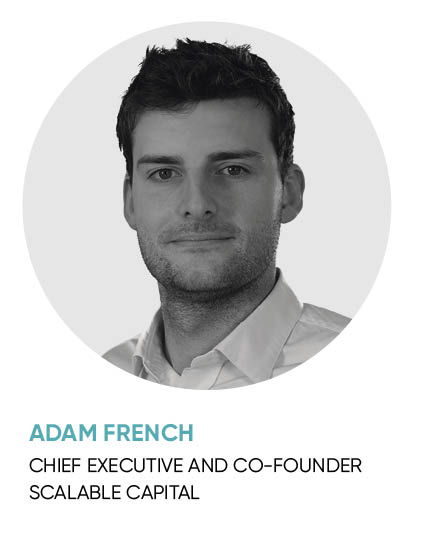 How did the company come about?
How did the company come about?
I was working at Goldman Sachs as a derivatives trader. I found that in my personal life I was becoming the go-to person for friends and family who had a common issue – they wanted advice on how to invest their money, but they didn’t have the amount of capital required to get a professional to help them.
Together with three colleagues, I left Goldman to found Scalable Capital, alongside a professor who is a world-renowned expert in the fields of risk management and financial econometrics. We believed technology could be used to create an investment service that could address all the problems we saw with existing offerings.
How have you grown the company?
Many of our clients are smart, busy professionals, time poor yet cash rich. They are crying out for a professional service that works for them. All aspects of what we do resonate with them – the convenience of our service, its cost efficiency, the way we use technology to optimise their portfolio allocation, the access to real-time data and our low minimum investment.
We founded the company in December 2014 and since then we have gained authorisation by the Financial Conduct Authority here in the UK. From a founding team of five, we’ve now expanded to 45 employees and already manage more than £100 million in assets for over 2,500 clients here as well as in Germany and Austria.
Do you aim to replace advisers or asset managers?
Some advisers have been quite sceptical of what we do and I think there is a fear of us taking their jobs. However, others, including ourselves, have a different view. Our offering complements the services at which advisers excel.
We offer a better way to invest and manage their clients’ money, using technology and big data in a way they cannot replicate. Letting us take care of this part of their role means the advisers have more time left to focus on what they do best, which is holistic financial planning.
We believed technology could be used to create an investment service that could address all the problems we saw with existing offerings
Which companies will be hit by this growing use of technology in asset allocation?
Around 99 per cent of the retail investment industry still uses outdated models. Most firms just offer a small set of standardised portfolios with static weights for the different asset classes, such as bonds and equities.
The last two decades of capital markets research have provided us with a greater understanding of how technology can change things. But while some leading hedge funds are using algorithms to process large amounts of data to make better investment decisions, traditional asset managers running the mutual funds available to retail investors still rely predominantly on humans to make tactical investment decisions.
Just like the less quantitative hedge funds that have seen hundreds of billions of dollars of outflows in the last couple of years, these asset managers will suffer because their outdated approach is not giving people the returns they need, especially after fees.
What does the future hold for Scalable Capital?
We will continue to grow in the UK and abroad. We’re going to close a significant, eight-digit funding round early this year and this will give us the resources to keep implementing new features and acquire new clients.
Also, we see a lot of change in the broader industry, and increasingly banks and independent financial advisers approach us, asking us to collaborate and build an offering for them. This means that we keep hiring financial and software engineers to invest not just into our own offering for direct clients, but also into projects with incumbents. What we learn from these collaborations will eventually also benefit our own clients, helping us to achieve our goal of fundamentally changing the way people invest for the better.
